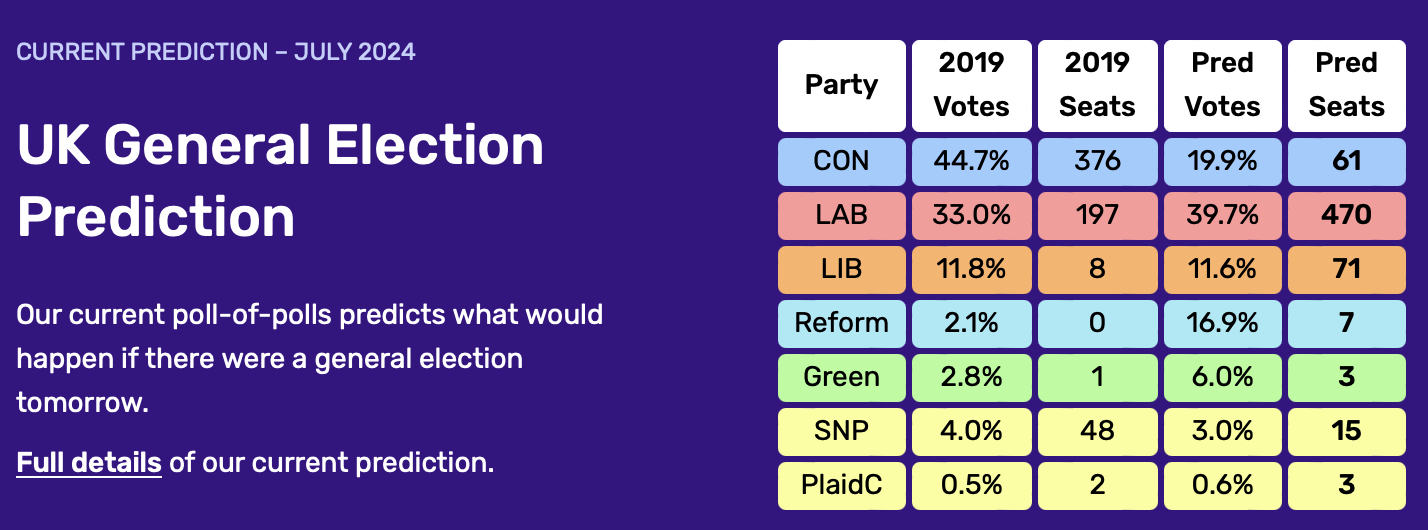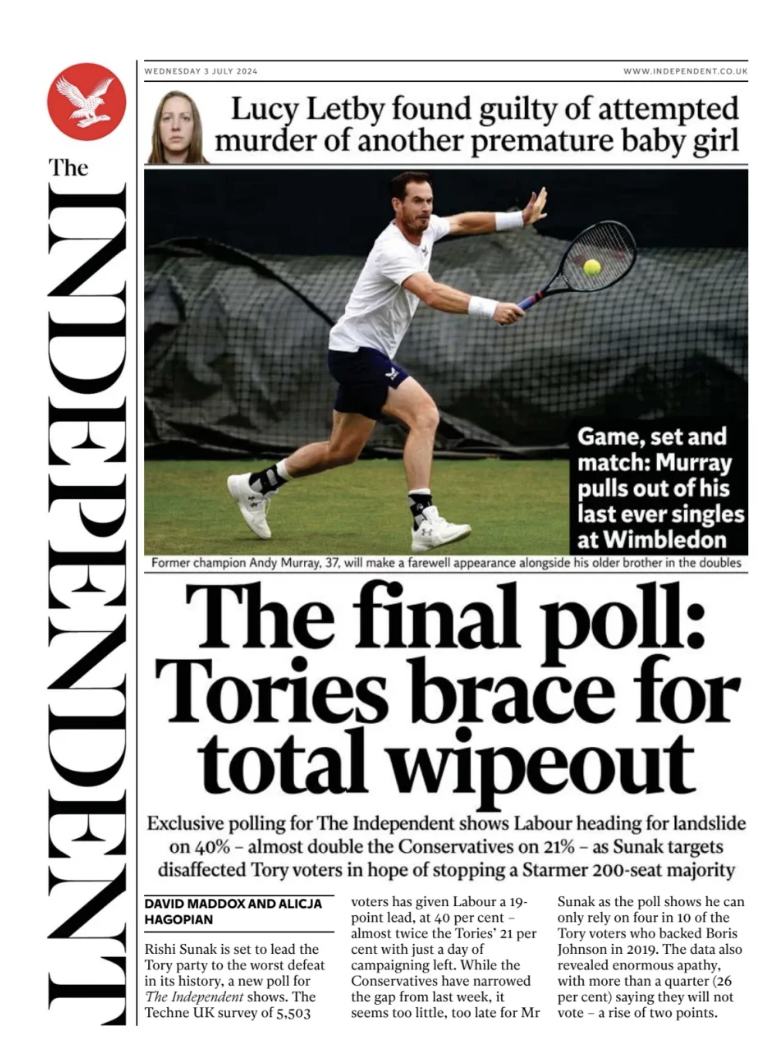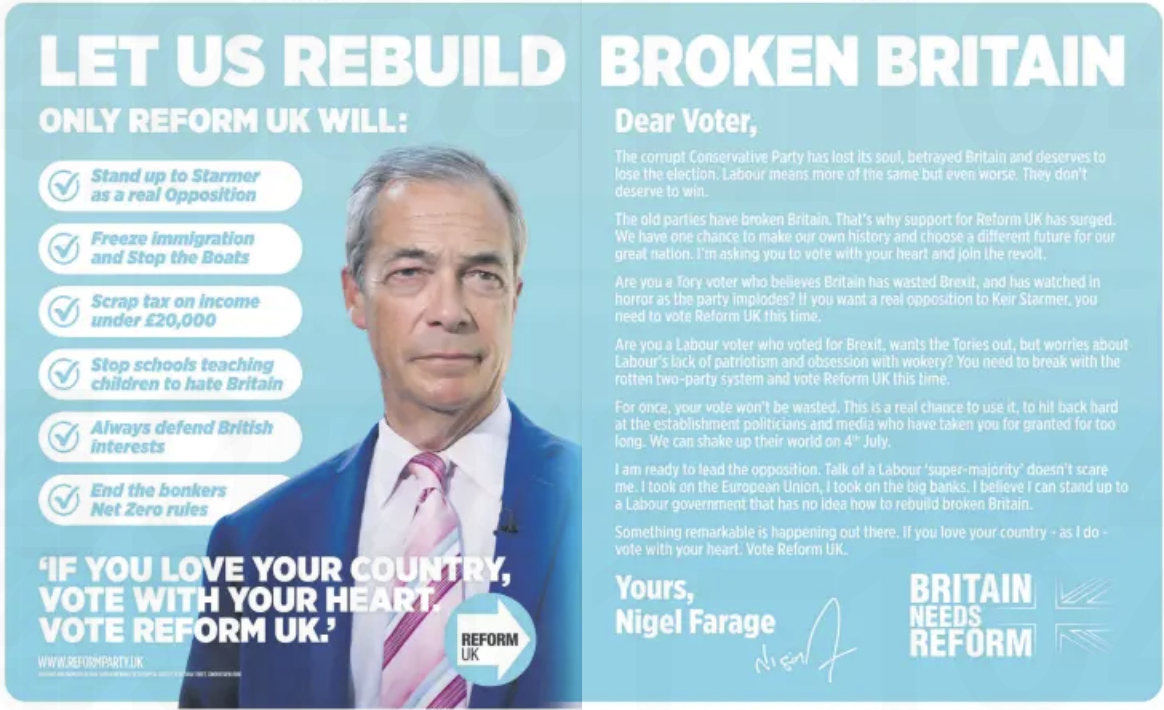Tomorrow’s UK General Election (4 July 2024) will see Britain’s ruling Conservative Party obliterated after 14 years in power. 
The Opposition Labour Party will win a huge majority though pollsters disagree on its scale. But we all know the tectonic plates are shifting and the political landscape will be very different on 5 July when the votes are counted.
The election prediction website, Electoral Calculus, gives the Conservatives 61 seats in the new House of Commons trailing the Liberal Democrats who are on 71. So Rishi Sunak – assuming he holds his traditionally ultra-safe seat of Richmond and Northallerton - may not even be the Leader of the Opposition.
How on earth did it come to this?
Today’s New York Times tells its readers
“The Conservative party has dramatically reshaped Britain since 2010, orchestrating its exit from the European union, slashing spending on public services and cutting welfare spending. Time and again, British voters have returned the party to power. But Britons say their country is worse off now than when the Conservatives took office.”
Very true.
But there's more to it than that. The rot is everywhere.
D Day
We witnessed Rishi Sunak's terrible misjudgement, leaving the D Day Commemorations early - so that he could get back to the UK for a political interview.
And in the middle of the election campaign we learn some very important people in Sunak's immediate circle had bet on the most likely election date.

The police are now involved.
Britain has seen a merry-go-round of five Prime Ministers in less than a decade. One of whom, Boris Johnson, was found to have deliberately lied to MPs. In our Parliamentary system in Canada, as in the UK, this is the ultimate hanging offence.
The Canadian Parallel
In Canada’s Federal Election in 1993 the newly installed Prime Minister, Kim Campbell, lost her riding in Vancouver Centre and saw her Progressive Conservative Party wiped out, reduced to two seats. The Bloc Québécois became the Official Opposition.
In his 2005 book “The Secret Mulroney Tapes” Peter Newman says the election was a plebiscite on Brian Mulroney whose 3,202 days as Canada’s Prime Minister ended on 24 June 1993, roiled by scandal and disaffection.
“The historic Party, which in its various guises had founded the country and fielded twelve Prime Ministers who had governed Canada for more than half a century, was eliminated from contention.”
Throwing in the towel
In Britain, the Conservatives make no pretence that they can win tomorrow’s election. It is all about limiting the damage that a Labour “super majority” would inflict on the country. They say a bad result could cement Labour in power for a generation. People simply don’t believe that sort of nonsense.
For long enough the Conservatives had no other parties competing against them for votes on the right.
The so-called progressive vote was too often split between Labour and the Lib Dems allowing the Conservatives to slip through the middle – like Doug Ford’s Ontario PCs - often with well under 50% of the vote.
Reform UK
Tomorrow’s election signals the arrival of Nigel Farage’s insurgent Reform UK Party which will take a huge bite out of the Conservative vote although it is uncertain how this will translate into seats because of the vagaries of first-past-the-post.
Farage has been bearding the lion in its den, taking his populist message to the readers of the Daily Mail, telling them it’s time to ditch the Conservatives. (see below)
His message seems to be resonating in true blue Skipton and Ripon – Conservative for as long as I can remember and only a few miles from where I used to live. Unbelieveably, there is a 66% chance of Reform UK winning there.
The kaleidescope is turning. We wait to see where the pieces fall.
This email address is being protected from spambots. You need JavaScript enabled to view it.

